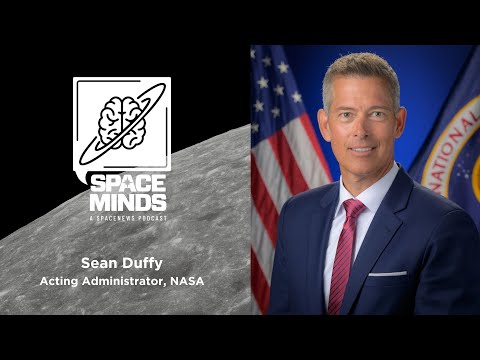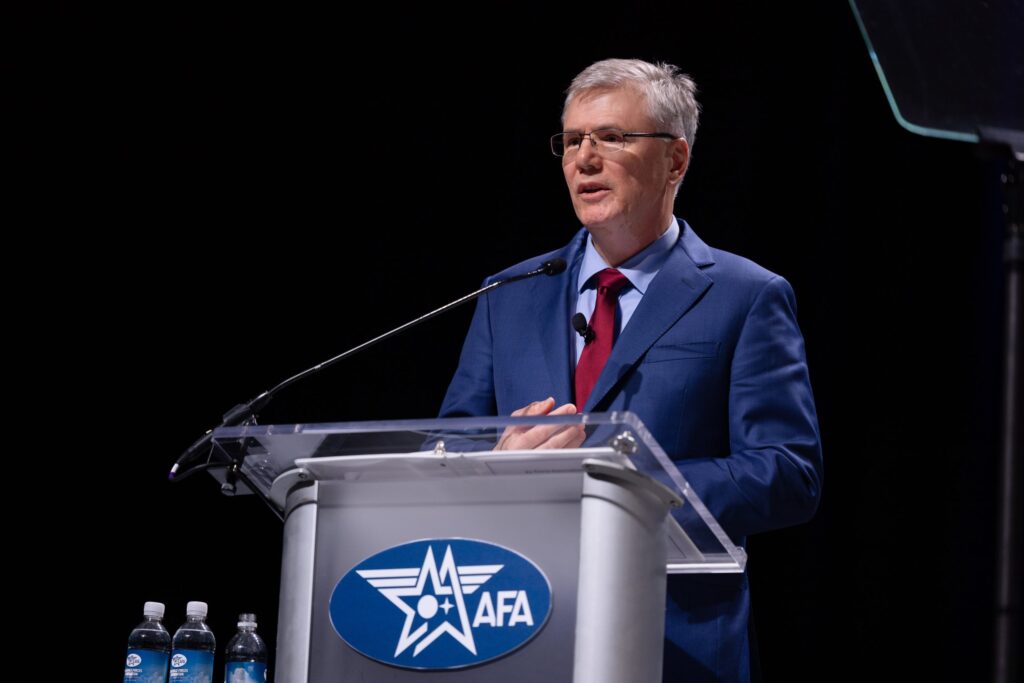Now Reading: NASA’s Sean Duffy surprising leadership
-
01
NASA’s Sean Duffy surprising leadership
NASA’s Sean Duffy surprising leadership

In this week’s episode of Space Minds, host Mike Gruss is joined by SpaceNews senior writer Jeff Foust to break down the surprising appointment of Sean Duffy as NASA’s Acting Administrator.
From his unexpected dual role as Secretary of Transportation to his growing influence on the Artemis program, nuclear power on the Moon, and NASA’s embattled budget, Duffy has quickly become a central—if unconventional—figure in U.S. space policy. The conversation explores how industry, Congress, and the space community are reacting to his leadership, and what’s at stake as NASA navigates an uncertain future.
Show notes and transcript
Click here for Notes and Transcript
Time Markers
00:00 – Episode introduction
00:31 – Welcome
00:43 – A surprise pick
01:44 – Duffy’s history
02:34 – An unusual acting administrator
03:49 – When will someone be nominated?
04:37 – Working two full-time jobs
05:57 – Artemis proponent
07:52 – Lunar nuclear reactors
09:45 – NASA’s budget
12:59 – Resistance in Congress
13:41 – Industry view
15:30 – Mars news
Transcript – Jeff Foust Conversation
Mike Gruss – Hello and welcome to the Space Minds Podcast. I’m Mike Gruss from SpaceNews, and I’m joined today by Jeff Foust SpaceNews, a senior staff writer who covers NASA and civil space.
Jeff, we have not talked on the podcast much this summer, but NASA has a new acting administrator in Sean Duffy, so let’s start there. Talk to me about when he was named the Acting Administrator, and what kind of accompanied that whole change.
Jeff Foust – Yeah. I mean, he came out of nowhere, basically to be named Acting Administrator of NASA. He had been secretary and is still Secretary of Transportation since the beginning of the current Trump administration, but basically there was a truth social post by the President on a Wednesday night in July, about two months ago, announcing that Duffy would also take on the role of Acting Administrator of NASA, and he has been serving in that position since then. He’s acknowledged he doesn’t know how long he’ll be in that position. He said an internal Town Hall about a week ago that, you know he’s, he’s serving at the pleasure of the President, and he doesn’t know if he’s going to be around for a day a month a year.
Mike Gruss – Yeah, and what? What did we know about him before this event? I mean, we talked about the Secretary of Transportation. He spent time in Congress. Did we know about an interest in space, or a passion for space, or a particular business acumen, like, what? What made this seem like a good fit?
Jeff Foust – Yeah, you know, one of the reasons why it was surprising is that he had not really talked about space at all, other than in very passing references in his role as Secretary of Transportation, which includes the FAA when FAA oversees commercial launch activities. But there is nothing in there to suggest a desire or yearning or particular expertise to be handed the reins of NASA, but that’s what’s happened.
Mike Gruss – Yeah, and in this. And I know we reported at the time that we had that hadn’t happened before, too we hadn’t had an acting administrator in from in this capacity. Obviously, there’s been lots of acting administrators, but not in the in the way that Duffy kind of took it.
Jeff Foust – Yeah, traditionally, the acting administrators or NASA have been senior officials within NASA itself, civil servants, typically the Associate Administrator, who is the highest ranking civil servant, although at the beginning of the Trump administration, the White House picked Janet Petro, who was the director of the Kennedy Space Center, to instead serve as acting administrator, and the assumption was she was going to continue in that role for the foreseeable future. Of course, there was all the turmoil about the nomination, and then the revoked nomination of Jared Isaacman to be NASA Administrator.
You know, his nomination being pulled just days before he was set to be confirmed by the Senate. That put a, you know, a big question mark, in terms of the future of who would be running NASA. And you know, to be clear, the White House has yet to nominate someone to serve as NASA Administrator. So whoever is going to be the Acting Administrator is going to be serving in that role for months to come.
Mike Gruss – Yeah, and I know we’ve kind of joked about it that, hey, a new nomination could come in five minutes, or it could come in six months, but there’s no, there’s no reason to think that there’s, there’s someone on the way around, the way soon.
Jeff Foust – Yeah, I mean, there were rumors, particularly right after Isaac men’s nomination was withdrawn about various individuals who might be nominated. The President had said that he would pick someone soon. That’s been more than three months now, there has been no nomination, and the rumor mill has really died down. So again, it’s possible, given that Duffy’s selection as Acting Administrator came out of nowhere, a nomination for a new NASA Administrator could equally come out of left field. But there’s no reason to think that anything is coming anytime soon, right?
Mike Gruss – And we talked about, he is the Secretary of Transportation. Do we have a good understanding, or has? Has there been a lot of discussion about, how much time is he spending with the Department of Transportation? How much time is he spending with NASA? These are both obviously very big jobs, right?
Jeff Foust – I mean, both NASA, administrator and Secretary of Transportation, are full time jobs, and so he has to split his time between both. He has been at NASA headquarters on a fairly regular basis. He has been out to some of the NASA field centers. He was at the Johnson Space Center last month. He was down at the Kennedy Space Center at the end of July for a commercial crew launch. So he is getting out there in that role as NASA Administrator. But you know, earlier this week he was, you know, in Indiana, looking at a Interstate bridge construction project in his role as Secretary of Transportation.
Mike Gruss – You know, it’s when you said, Hey, this nomination came or this appointment came in July. I thought, man, was it only July? It felt like earlier in the summer than that, and when I was preparing for this, I was thinking, hey, there’s maybe been two or three kind of key moments so far this summer where Duffy’s kind of been at the center of the action there. I have a short list, but you know, where, where do you think that he’s really stood out? And it’s been like he’s put his mark on what’s going to happen with the agency in the next six months.
Jeff Foust – I think what’s really stood out is he’s become a very ardent proponent, supporter of the Artemis lunar exploration campaign. He has been out there talking multiple times that the US is returning to the moon, that we are going to do so before the Chinese he’s been very adamant that he’s not going to allow China to land astronauts to the moon before NASA can return astronauts there. He’s been very outspoken about that.
There was the case last week when a former NASA Administrator, Jim Bridenstine, testified before the Senate Commerce Committee. He said that, you know, if he felt it was highly unlikely that NASA would get there before China, given the some of the issues with the starship, lunar lander, and Duffy in an internal Town Hall The next day, you know, said he was angry about that, and those comments through shade and all of NASA and you know, again, reiterated his desire to press forward with Artemis So he has become, you know, the most prominent cheerleader for Artemis in many respects, and that’s been one of his biggest activities in his two months in office so far.
Mike Gruss – Yeah, that was a little, I thought that was a little unexpected, too. I think maybe, you know, sometimes, particularly maybe in the past, that when comments like what Bridenstine made had, had taken place that maybe people shrugged or just said, okay, but I thought the reaction to it, and I think maybe the the degree to which he said, You know exactly the word you said, angry, that that that showed something that maybe, maybe I was taken back by. Of it, and didn’t expect that, that he was so invested in that the other, the other, one of the other storylines I wanted to ask you about was this focus on lunar nuclear reactors. Talk a little bit about that, and, and, and where he might be making a push there.
Jeff Foust – Yeah, he signed a policy directive at the end of July directing NASA to put forward a plan to develop a nuclear reactor for use on the surface of the moon, generating at least 100 kilowatts of power and be ready by 2030 it was interesting because the directive came just several weeks after an outside report by the Idaho National Laboratory that had recommended as one of its options, pursuing a plan a lot like what’s in the policy directive, a reactor of that size, the use of public private partnerships, rather than a traditional government led program to develop this reactor. And so this was something where, you know, he was taking the opportunity to make fairly decisive action.
Clearly, there was a lot of going on behind the scenes to develop this. I don’t think Duffy is an expert in nuclear power systems, so some of the specific details in the directive, like what use of power converters that this reactor should use, were probably not at his urging, but he was certainly providing the impetus to move that program forward.
Mike Gruss – Yeah, and I think that’s, that’s what’s interesting about it, right, to use your word, it’s that impetus, that push that’s coming from headquarters, that that these are the prior, these may be the priorities, and this is, this is where the agency is headed. I think, you know, a couple other things that I was thinking about was, you the story about some membership on the NASA Advisory, some of the advisory committees.
There was a meeting with the head of Roscosmos, that where NASA didn’t talk a lot, but Russia did. But I think you know, where there’s probably still a lot of questions are about the budget, and so how did, how do you kind of frame or think about these questions of the budget? Obviously, this has been, I think, by many accounts, an unpopular budget for a lot of folks in the space industry, for a lot of folks in NASA. But Duffy was not directly involved, or does not appear to be directly involved with with putting this budget together. How do we kind of square his role in the budget and his role with the budget moving forward, maybe till the end of the year or longer?
Jeff Foust – Yeah. I mean, you know, you’re correct. You know, he inherited this budget proposal, which came out in May, you know, it was developed primarily by the White House Office of Management and Budget, which was taking, you know, a very strong stance on reducing spending. It was cutting NASA’s budget by about 25% areas like science and space technology, getting cuts of closer to 50% you mentioned, it’s pretty unpopular. Both the House and Senate appropriations bills that are currently working their way through the committees and onto the the full House and Senate largely reject the budget they’re providing close to what the agency got last year, maybe moving some money around between exploration and in science and things like that, but largely rejecting the wholesale cuts that the administration was trying to make in NASA’s budget.
You know, so Duffy has a question, does he try and defend that budget proposal, as you know, the appropriations process winds on, or does he acknowledge that that’s not going to happen? Likely, in Congress, and tries to find, you know, an alternative approach to, you know, preserve some priorities in certain places, you know, and maybe acknowledge that some of the cuts that were desired aren’t going to happen. One of the big challenges coming up is we’re nearing the end of the fiscal year. The end of September is the end of the fiscal year, and Congress is debating, is there going to be a continuing resolution to start fiscal year 2026 on October 1, and if so, how long will that last? Or will there be a shutdown? Those are all open questions at this point in time.
There’s another question about some concerns, particularly in the science community, that the administration might still try to enact elements of the fiscal year 2026 budget proposal when that CR takes effect, such as trying to wind down any number of science missions slated for cancelation of the budget proposal, even though the House and Senate bills would largely or entirely restore the science budget. And if that’s the case, would Duffy go along with that? Would he accept that? And what would he argue to defend a move like that, given the likely opposition from both the science community and also from Congress?
Mike Gruss – We’ve already seen some hints of resistance, I think, particularly from the Democrats who have warned NASA that, hey, don’t, don’t wind down these programs until, until we say, correct.
Jeff Foust – Yeah, I mean that. You know that’s been a big concern among Democrats in both the House and Senate on on this issue, how much leverage they have is, is an open question, because they’re in the minority in both the House and Senate, but they can certainly complain very loudly and for stuffy to defend fairly unpopular budget cuts, and that may be something that he may not want to do. So we have to wait and see how that’s going to play out in the coming weeks.
Mike Gruss – You’ve talked to folks in industry all the time. You’re talking to folks on the Hill. What, what are they saying about this 10 years so far? And what are they looking for? What are they looking for from him, or what kind of decisions are they expecting from him in the next couple months?
Jeff Foust – Yeah, I’ve talked with with people in some companies that have actually had meetings with Duffy. They have been, in some cases, pleasantly surprised. He seemed very engaged, very interested in what’s going on. You know, knowledgeable, perhaps to more of a great degree than they expected, given that, you know, NASA administrator is a part time job for him. But you know, they seem, you know, they seem positive about that, but certainly they want, you know, to some sense of certainty, as much certainty as possible in this time, in terms of what direction he’s going to take certain programs.
You know, you mentioned the nuclear power decision. There is also the commercial space station decision to shift plans for how to go to the next phase of that that’s causing some of the companies that are involved to rethink their plans, because NASA is going to take a different approach to supporting those and perhaps not immediately accept permanently crewed space stations, as was expected around the end of the decade. So people are looking for some more understanding about, you know, where he stands on those issues and how that will affect their plans. But again, sort of the big overhang question about this is, how long is he going to be around? No one knows, including himself. You know, how much of a imprint he can put on the agency when he may be acting administrator for the next year, or just for the next week.
Mike Gruss – Well, one thing we do expect today is September 9, as we’re recording this, he is expected to speak tomorrow. Tell us a little bit about that and some of the questions that are going to come where with a press call that he’s going to be part of.
Jeff Foust – Yeah, and NASA announced on Monday the eighth that they were going to do a press briefing on relatively short notice on Wednesday the 10th to talk about a discovery made by the perseverance Mars rover. Perseverance is the rover that’s currently collecting samples of Martian rocks for eventual return to Earth, but it’s also doing some analysis of those rocks.
The expectation is, you know, we’re going to find out some discovery, maybe about bio signatures, evidence of past life, things like that, of scientific interest. And it was interesting to see Duffy included on the list of speakers who would be participating beyond NASA Science Leadership and the the scientists involved. It’s interesting his inclusion, because that budget proposal, that unpopular budget proposal we were just talking about, calls for canceling Mars sample return the program to bring back those samples perseverance has been collecting, as well as canceling some other existing Mars missions and cutting the budget of the perseverance rover itself.
So there’s a possibility that you know, he may you know, celebrate a major discovery made by a Mars mission, but then have to defend cuts to that and other Mars missions, which may be a bit uncomfortable, but he may use that to to make announcements in terms of changes in directions or things he wants to do differently with the budget proposal. It’s interesting that he’s included. It’s the first time, actually, He’s participated in a NASA press conference since becoming Acting Administrator. Most of his media appearances have been limited to hits on Fox News and a few other television networks. So actually having him in a press conference where he’ll be taking questions from a broader swath of the media, will be noteworthy in and of itself.
Mike Gruss – Great. Well, Jeff, thanks so much for joining us today and to our listeners and viewers. Thanks so much for watching and tuning in.
About Space Minds
Space Minds is a new audio and video podcast from SpaceNews that focuses on the inspiring leaders, technologies and exciting opportunities in space.
The weekly podcast features compelling interviews with scientists, founders and experts who love to talk about space, covers the news that has enthusiasts daydreaming, and engages with listeners. Join David Ariosto, Mike Gruss and journalists from the SpaceNews team for new episodes every Thursday.
Watch a new episode every Thursday on SpaceNews.com and on our YouTube, Spotify and Apple channels.
Be the first to know when new episodes drop! Enter your email, and we’ll make sure you get exclusive access to each episode as soon as it goes live!
Space Minds Podcast
“*” indicates required fields
Note: By registering, you consent to receive communications from SpaceNews and our partners.
Stay Informed With the Latest & Most Important News
Previous Post
Next Post
-
 01Two Black Holes Observed Circling Each Other for the First Time
01Two Black Holes Observed Circling Each Other for the First Time -
 02From Polymerization-Enabled Folding and Assembly to Chemical Evolution: Key Processes for Emergence of Functional Polymers in the Origin of Life
02From Polymerization-Enabled Folding and Assembly to Chemical Evolution: Key Processes for Emergence of Functional Polymers in the Origin of Life -
 03Astronomy 101: From the Sun and Moon to Wormholes and Warp Drive, Key Theories, Discoveries, and Facts about the Universe (The Adams 101 Series)
03Astronomy 101: From the Sun and Moon to Wormholes and Warp Drive, Key Theories, Discoveries, and Facts about the Universe (The Adams 101 Series) -
 04Φsat-2 begins science phase for AI Earth images
04Φsat-2 begins science phase for AI Earth images -
 05True Anomaly hires former York Space executive as chief operating officer
05True Anomaly hires former York Space executive as chief operating officer -
 06Hurricane forecasters are losing 3 key satellites ahead of peak storm season − a meteorologist explains why it matters
06Hurricane forecasters are losing 3 key satellites ahead of peak storm season − a meteorologist explains why it matters -
 07Thermodynamic Constraints On The Citric Acid Cycle And Related Reactions In Ocean World Interiors
07Thermodynamic Constraints On The Citric Acid Cycle And Related Reactions In Ocean World Interiors


















